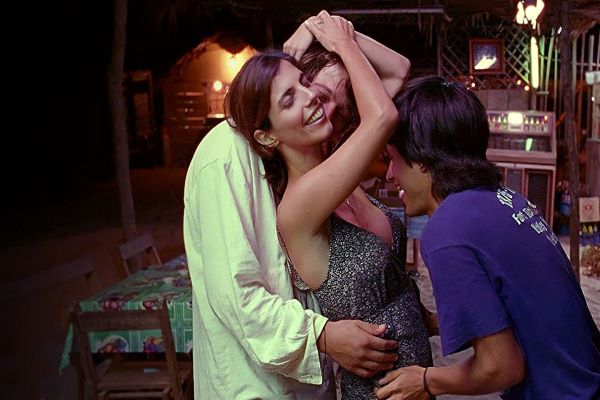Alfonso Cuaron stepped out of Hollywood and returned to his beloved motherland for his erotic coming-of-age road film Y Tu Mama Tambien. Even though apparently it looks like a comedy film, there are multiple layers underneath it. Amidst the growing up and sexual awakening of two teenage boys, Cuaron highlights multiple important contemporary issues. Two teenage boys go on a road trip to an imaginary beach “Heaven’s Mouth” with an older woman who teases, seduces, and has sex with them. In the backdrop of their journey, the film shows Mexico’s political unrest, social class division, poverty, the curse of capitalism and modernization, and homosexuality. The fragrance of youth does not last long. In the end, the woman passes away and the boys never meet again. Y Tu Mama Tambien depicts two parallel tracks. On one track, the boys progress toward maturity, and on the other track, Mexico progresses toward a robust democracy.
Elite Tenoch (Diego Luna) and lower-middle-class Julio (Gael Garcia Bernal) are teenagers and close friends. They have sex with their girlfriends before seeing them off at the airport for their Italy trip. Like usual teenagers, they have erotic fantasies. They befriend Tenoch’s cousin Jano’s Spanish wife Luisa (Maribel Verdu) at a wedding party. Tenoch and Julio invite Luisa for a trip to the sensuous imaginary beach “Heaven’s Mouth”. Jano informs Luisa over the phone that he has cheated on her. Being cheated by Jano, a heartbroken Luisa accepts their invitation. The three start their trip to “Heaven’s Mouth”.

During the journey, Tenoch, Julio, and Luisa talk about their lives and sexual experiences. Rural Mexico’s immense natural beauty unfolds in front of their eyes. The time period is just before the famous Mexican election that dethrones the Institutional Revolutionary Party after the regime of 71 years. Protesters demonstrate almost everywhere and countless police officials are on continuous search and arrest operations. The trio spends the night in a hotel where Luisa seduces and has sex with Tenoch. This creates tension between the two. She seduces and has sex with Julio for equality. The boys confess to having sex with the other’s girlfriends. Their car passes by Tepelmeme where Tenoch’s nanny belongs, but he never visited. They suddenly take a deserted coastal road that leads them to a beach coincidentally called “Heaven’s Mouth”. They relax on the beach and put up a tent, which is ransacked by a herd of pigs. The trio befriends the family of a fisherman, Chuy, who resides there. They spend that night dancing and discussing previous sexual experiences in Chuy’s village nearby. The boys end up kissing each other.
The narrator informs that their return journey was quiet and uneventful. Luisa stayed back there to explore a few more beaches. The boys’ girlfriends broke up with them and they stopped meeting each other. After a year, They meet at a cafe in Mexico City by chance. Tenoch informs Julio that Luisa died of cancer a month after their trip. She was well aware of her illness but did not disclose it to them. A little later, Tenoch leaves the cafe as his girlfriend was waiting outside. They never met again.
Filmmaker Alfonso Cuaron was well-settled in Hollywood and staying in New York when he thought about making a Mexican film. He was bored and closed himself inside his New York apartment for a few days. He was sure that he was not making the type of films that inspired him to be a filmmaker. He called his brother Carlos and together they decided to make an original Mexican film. He returned to his root for making this film. Even though they wrote the script of an erotic coming-of-age road drama, it touches upon multiple important topics. However, the heart of Y Tu Mama Tambien is purely Mexican and Cuaron’s long-time collaborator and cinematographer Emmanuel Lubezki captures magnificent views of rural Mexico. From sunshine to sunset, from vacant streets to sensuous beaches, his camera captures Mexico, its people, and its sublime natural beauty.

During the journey, police officials are seen multiple times searching, interrogating, and arresting demonstrators. Political unrest is seen almost everywhere. Mexico is getting ready for the most crucial change in its political landscape. For the very first time in the last 71 years, it would get its first president, not from the Institutional Revolutionary Party. Cuaron draws two parallel tracks in this film. On one track, a much older woman Luisa transforms Tenoch and Julio from boys to men. On the other track, Mexico matures from a single-party ruled country to a much stronger democracy. Cuaron also highlights the pain of modernization and capitalism when the narrator informs that at the end of the year, Chuy and his family will have to leave their home as a new luxury hotel will rise in San Bernabe. They will relocate to the outskirts of Santa Maria Colotepec. Chuy will attempt to give boat tours, but a collective of Acapulco boatmen supported by the local tourism board will block him. Two years later, he will end up as a janitor at the same hotel. He will never fish again. In the end, Cuaron touches upon homosexuality when Tenoch and Julio kiss each other.
Cuaron also highlights the class difference in Mexican society. Tenoch belongs to an elite family whereas Julio belongs to a lower-middle-class family. Tenoch’s father is a Harvard-educated economist and the secretary of state. Julio is not interested in elite society or extravaganza. At the wedding ceremony, he asks Luisa whether she is bored there. While Tenoch belongs to rich Mexico, Julio represents the opposite side of it. The narrator informs that Julio lights matchsticks to avoid the smell in Tenoch’s house and Tenoch lifts the toilet seat by his feet. The narrator informs that the traffic jam was due to an accident. A bricklayer Marcelino was hit by a speeding bus as he never used the pedestrian bridge as its poor location forced him to walk three extra miles to his work site. His unidentified body was collected by Red Cross and taken to the city morgue. It took four days for the corpse to be claimed. An old man is seen begging in the hotel and a group of people is seen asking for some money on the street in the name of their little queen. In Y Tu Mama Tambien, Cuaron has shown the vibrant yet true colors of Mexico including its socioeconomic condition at the juncture of the 20th and 21st centuries.
Gael Garcia Bernal as Julio and Diego Luna as Tenoch efficiently and wholeheartedly portray Mexican youth on the verge of the new millennium and political era. Maribel Verdu as Luisa is charming, beautiful, playful, and seductive. Music director John Murphy uses multiple soundtracks which establish the theme of the film. Y Tu Mama Tambien was nominated for Best Original Screenplay at the 75th Academy Awards and 56th BAFTA Awards. It was also nominated for Best Foreign Language film at the 59th Golden Globe Awards and Best Film Not in the English Language at the 56th BAFTA Awards.
